Accessible Tourism in Japan: Expectations vs. Reality
Insights from 221 Overseas Visitors with Disabilities from 35 Countries
Key Findings
- Many overseas visitors with disabilities feel that historical buildings and gardens in Japan are difficult to access by wheelchair, and have the impression that barrier-free progress in Japan is lacking
- Visitors to Japan reported positive feedback on clean toilets and kind people, but also pointed out issues such as lack of accessible rooms in accommodations and poor walking surfaces at tourist sites
- Many cited legal frameworks as the reason why accessible tourism is more advanced in other countries, particularly the United States, highlighting the delay and inadequacy of legal regulations in Japan
Accessible Japan (tabiLabs Inc., Shibuya-ku, Tokyo, CEO: Joshua Grisdale) which provides barrier-free tourism information about Japan to overseas audiences and supports inbound travel for people with disabilities, and JTB Tourism Research & Consulting Co. (Shinagawa-ku, Tokyo, President & CEO: Yoshito Kazama) have released the results of their joint survey “Survey on Perceptions of Accessible Tourism in Japan among Overseas Visitors with Disabilities”. This survey targeted foreign individuals with disabilities and their families using Accessible Japan’s resources, examining their pre-visit impressions of barrier-free facilities in Japan and the actual experiences of those who have visited. It particularly focused on specific experiences of difficulties encountered and positive aspects noted during visits to Japan, aiming to clarify the differences in perceptions of barrier-free facilities between overseas visitors and Japan. The survey results are expected to serve as a guide for strengthening the dissemination of barrier-free information for foreign visitors to Japan and developing a more inclusive tourism environment.
We will continue to promote research that provides new perspectives on tourism in Japan that respects diversity, aiming for travel that can be enjoyed by all people.
【Survey Overview】
Survey period: September 19 – October 15, 2024
Target respondents: 221 foreign individuals with disabilities or their family members using Accessible Japan
Survey Results:
About 70% of respondents are from English-speaking countries, with over 40% from the United States Equal proportions (about 40% each) of manual and electric wheelchair users, indicating a need for future accommodation of electric wheelchairs
Over 20% with intractable diseases, suggesting the need for deeper understanding of diverse disabilities
The survey received responses from 221 individuals across 35 countries and regions. About 70% were from English-speaking countries, likely due to Accessible Japan being an English-language site. The United States accounted for the largest share of respondents at 43.4%, followed by Australia (13.1%) and the United Kingdom (11.3%). The high proportion of U.S. members on Accessible Japan suggests a strong interest in accessible tourism from this region (Figure 1).
Regarding types of disabilities, manual wheelchair users accounted for 43.0% of respondents, while electric wheelchair users made up 42.1%. While manual wheelchairs are more common in Japan, this shows that electric wheelchairs are equally prevalent overseas. Electric wheelchairs require charging, and the voltage difference between Japan and other countries necessitates measures for battery charging. Additionally, accommodations for larger electric wheelchairs are needed.
Other respondents included those with intractable diseases (22.2%), cane users (19.9%), and individuals with autism (14.9%). These results indicate that accessible tourism needs to cater to a wide range of disabilities and conditions (Figure 2).
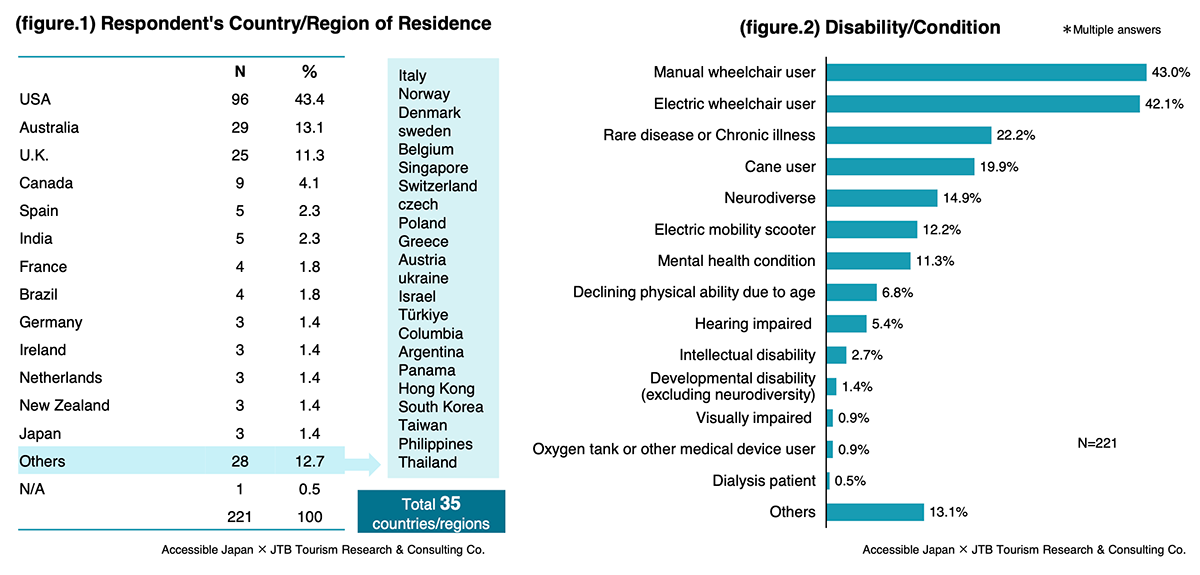
80.5% require accessible transportation, including public transit
High demand for both physical accommodations and accessible information
The most commonly needed accommodations for daily outings were “accessible transportation” (80.5%), “information on accessible tourist sites and facilities” (76.9%), and “barrier-free toilets” (73.3%). This reveals a high demand not only for physical accommodations like accessible transportation and barrier-free toilets but also for accessible information. Additionally, there is a need for accommodations for invisible disabilities, such as sensory goods and social stories. These are basic considerations necessary for daily life and travel. Meeting these needs and properly disseminating information could lead to increased tourism to Japan (Figure 3).
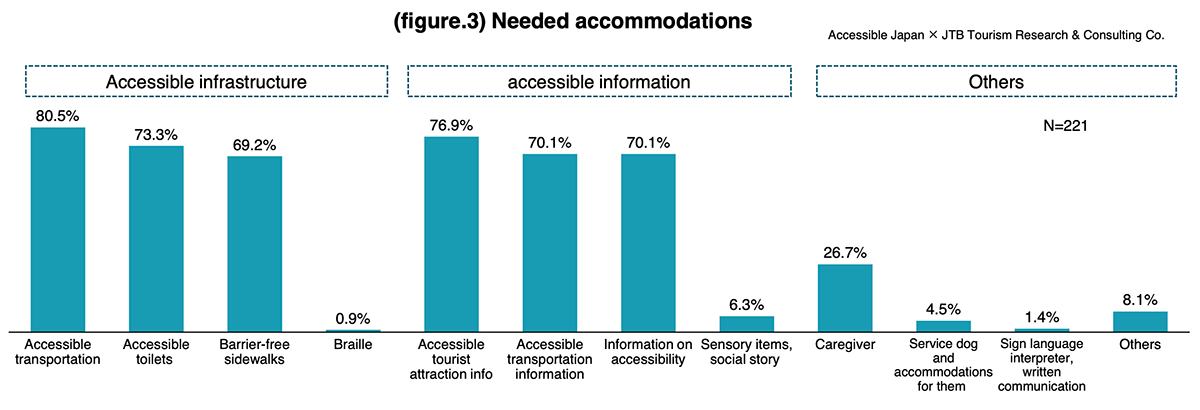
67.0% believe “many temples and gardens in Japan are difficult to access by wheelchair”
Those who have visited Japan rate “hotels, restaurants, and shops having narrow rooms and buildings” and “Japan not being advanced in accessible tourism” higher than those who haven’t, indicating that actual experiences fall short of expectations
The most common perceptions of accessibility in Japan were “many temples and gardens are difficult to access by wheelchair” (67.0%) and “hotels, restaurants, and shops have narrow rooms and buildings” (55.2%), indicating concerns about Japanese architectural styles. Additionally, 47.1% pointed out the delay in accessible tourism in Japan and difficulties for wheelchair users due to crowded public transportation.
Comparing perceptions between those who have and haven’t visited Japan, those with visit experience rated the following higher: “hotels, restaurants, and shops have narrow rooms and buildings” (63.5%), “Japan is not advanced in accessible tourism” (48.6%), “wheelchair users cannot enter public baths and hot springs” (41.9%), “few people can speak languages other than Japanese” (37.8%), and “lack of accommodation for allergies and gluten-free diets” (9.5%). This reveals that actual experiences often fall short of expectations, highlighting areas that need urgent improvement.
Conversely, the perception that “trains are too crowded for wheelchair users” was 10.8 points higher among those who haven’t visited Japan. This might be due to foreign media portraying Japan’s rush hour, suggesting a need for accurate information dissemination about Japan’s public transportation accommodations (Figure 4).
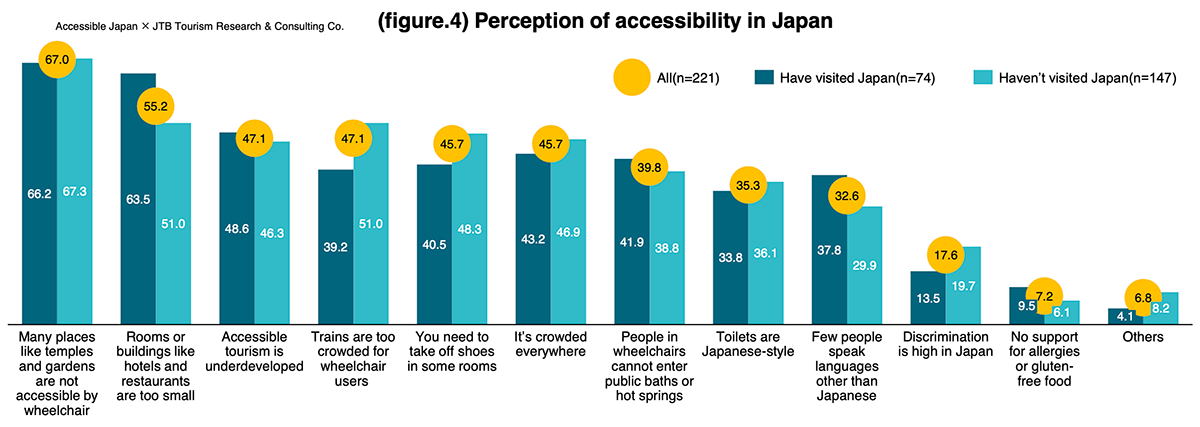
50.0% faced difficulties due to “lack of accessible rooms in accommodations”, 40.5% due to “poor ground conditions at tourist sites”
Positive aspects included “many kind people”, “easy-to-use toilets”, and “station staff helping with train boarding”
Among the 74 respondents who had visited Japan, over half had visited more than once. The most popular destinations were Tokyo, Kyoto, and Osaka, with interests primarily in Japanese food culture and historical buildings, similar to the interests of non-disabled tourists.
From an accessibility perspective, common difficulties included lack of accessible rooms in accommodations, poor ground conditions at tourist sites, and difficulty accessing public baths and hot springs. These indicate that Japan’s tourist facilities and services are not yet sufficiently user-friendly for people with disabilities. Responses about information being available only in Japanese and overcrowding hindering enjoyment of sightseeing suggest that language barriers and stress from crowding are significant obstacles.
On the positive side, the kindness of people and availability of free toilets were highly appreciated, showing that Japan’s omotenashi (hospitality) culture leaves a good impression on visitors with disabilities. Many also positively noted the assistance provided by station staff when using trains, indicating appreciation for the support in Japan’s public transportation system (Figure 5).
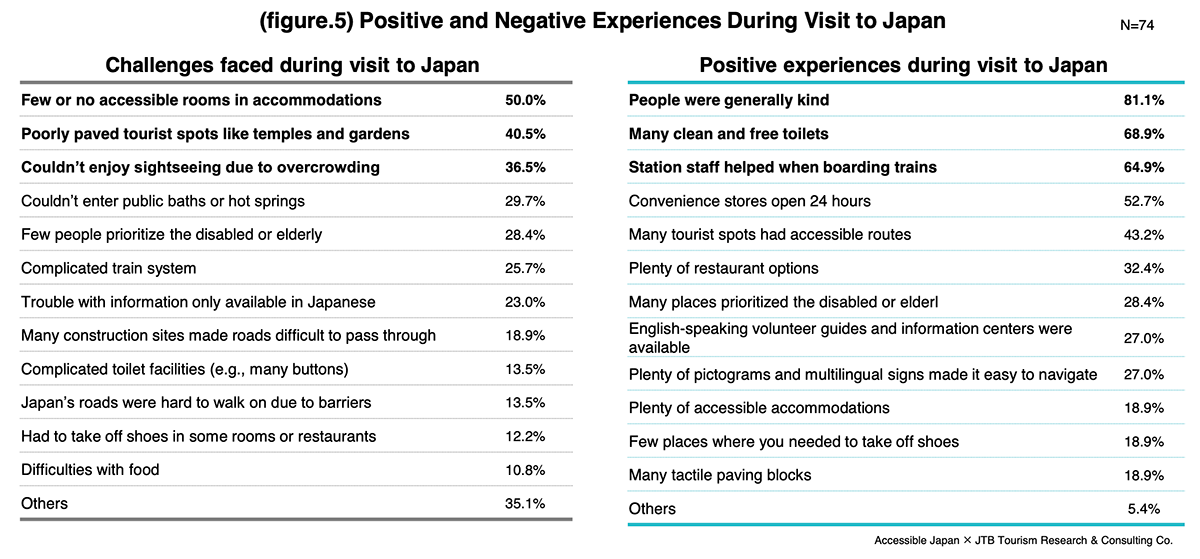
The United States and the United Kingdom are seen as leaders, with “well-established laws” cited as the main reason
For Japan, “Tokyo” was frequently mentioned, revealing the inadequacy of nationwide legal regulations
When asked about places or countries perceived as advanced in accessible tourism, over 40 respondents mentioned “the United States”. While this may be influenced by the fact that 40% of survey respondents were U.S. residents, many cited the Americans with Disabilities Act (ADA)* as the reason, indicating widespread understanding of the ADA both domestically and internationally. Other countries and regions mentioned included the United Kingdom, Spain, and Nordic countries. These countries have stronger legal enforcement regarding accessibility compared to Japan.
Japan was also mentioned in responses, but often specifically as “Tokyo”. This indicates that while certain major cities are advancing in accessible environment development, there is a delay or inadequacy in nationwide legal regulations (Figure 6).
*Americans with Disabilities Act (ADA): A comprehensive civil rights law prohibiting discrimination based on disability, enacted in July 1990
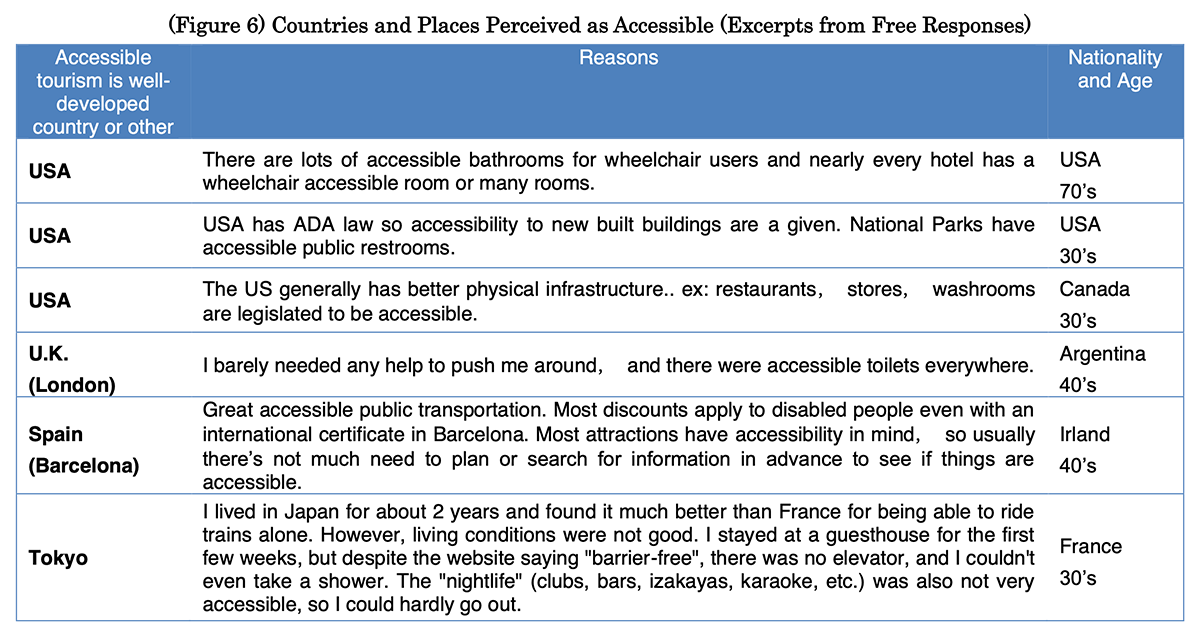
Summary
The survey results reveal that while overseas residents with disabilities have some concerns about accessibility in Japan, they show high interest in Japanese culture and services. However, actual visitors pointed out many areas for improvement, such as the lack of accessible rooms and access issues at tourist sites. For example, while major cities like Tokyo and Osaka have made progress in making public transportation barrier-free, many rural areas still lack adequate accommodations. At tourist sites, numerous steps and stairs at historical buildings and natural landscapes often make access difficult for wheelchair users.
By addressing these issues and enhancing information provision, Japan could become more accessible to people with disabilities. Suggestions include providing detailed barrier-free information through social media, strengthening staff training at tourist facilities and hotels, and promoting infrastructure improvements for better access.
The observation that Japan lags behind other countries in terms of legal regulations serves as important feedback for future barrier-free policies in Japan. Strengthening disability support initiatives across the entire tourism industry is particularly crucial. This would make Japanese tourist destinations more attractive to a diverse range of travelers. Furthermore, promoting accessible tourism is expected to provide more travel opportunities for people with disabilities within Japan, contributing to an improved quality of life. Through such efforts, we hope to see the development of tourist destinations that can be enjoyed by both non-disabled individuals and those with disabilities.
About Accessible Japan
tabiLabs Inc. is a company dedicated to providing an environment where people with disabilities can travel with peace of mind. Established in 2015, “Accessible Japan” serves as a reliable source of information for travelers with disabilities, providing information on barrier-free accommodations, tourist sites, and transportation within Japan. The company also operates “tabifolk”, a global community platform where travelers can exchange information.
Company Name: tabiLabs Inc.
CEO: Joshua Grisdale
Location: Shibuya Dogenzaka Tokyu Building 2F-C, 1-10-8 Dogenzaka, Shibuya-ku, Tokyo
Established: 2015 (Incorporated as tabiLabs Inc. on May 1, 2024)
URL: https://www.accessible-japan.com/
About JTB Tourism Research & Consulting Co.
JTB Tourism Research & Consulting Co. was launched in 2012, marking the 100th anniversary of JTB Corporation, with the aim of contributing to solving social and regional issues through tourism. With research, consulting, and tourism education as its core businesses, it strives to contribute to the development of regions and companies as a new era think tank that goes beyond the framework of tourism.
Company Name: JTB Tourism Research & Consulting Co.
President & CEO: Yoshito Kazama
Location: Tokyo Front Terrace 7F, 2-3-14 Higashi Shinagawa, Shinagawa-ku, Tokyo 140-0002
Established: June 21, 2001 (Changed name to JTB Tourism Research & Consulting Co. on June 1, 2012)
URL: https://www.tourism.jp
Contact Information
Accessible Japan
Contact: info@accessible-japan.com or hello@tabilabs.global
JTB Tourism Research & Consulting Co.
(Survey Representative) Senior Consultant: Yuko Katsuno
Inquiry Form: https://www.tourism.jp/en/contact/
